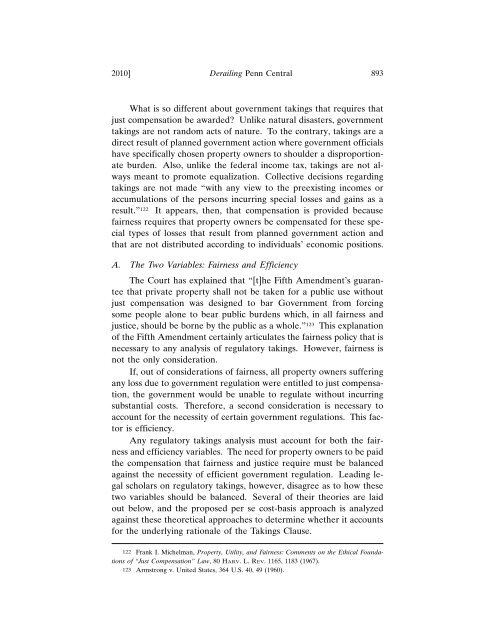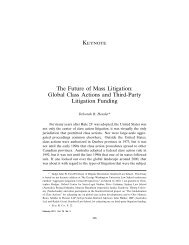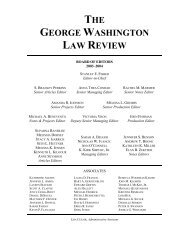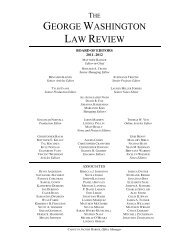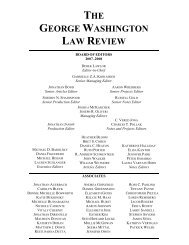View PDF - The George Washington Law Review
View PDF - The George Washington Law Review
View PDF - The George Washington Law Review
Create successful ePaper yourself
Turn your PDF publications into a flip-book with our unique Google optimized e-Paper software.
2010] Derailing Penn Central 893<br />
What is so different about government takings that requires that<br />
just compensation be awarded? Unlike natural disasters, government<br />
takings are not random acts of nature. To the contrary, takings are a<br />
direct result of planned government action where government officials<br />
have specifically chosen property owners to shoulder a disproportionate<br />
burden. Also, unlike the federal income tax, takings are not always<br />
meant to promote equalization. Collective decisions regarding<br />
takings are not made “with any view to the preexisting incomes or<br />
accumulations of the persons incurring special losses and gains as a<br />
result.” 122 It appears, then, that compensation is provided because<br />
fairness requires that property owners be compensated for these special<br />
types of losses that result from planned government action and<br />
that are not distributed according to individuals’ economic positions.<br />
A. <strong>The</strong> Two Variables: Fairness and Efficiency<br />
<strong>The</strong> Court has explained that “[t]he Fifth Amendment’s guarantee<br />
that private property shall not be taken for a public use without<br />
just compensation was designed to bar Government from forcing<br />
some people alone to bear public burdens which, in all fairness and<br />
justice, should be borne by the public as a whole.” 123 This explanation<br />
of the Fifth Amendment certainly articulates the fairness policy that is<br />
necessary to any analysis of regulatory takings. However, fairness is<br />
not the only consideration.<br />
If, out of considerations of fairness, all property owners suffering<br />
any loss due to government regulation were entitled to just compensation,<br />
the government would be unable to regulate without incurring<br />
substantial costs. <strong>The</strong>refore, a second consideration is necessary to<br />
account for the necessity of certain government regulations. This factor<br />
is efficiency.<br />
Any regulatory takings analysis must account for both the fairness<br />
and efficiency variables. <strong>The</strong> need for property owners to be paid<br />
the compensation that fairness and justice require must be balanced<br />
against the necessity of efficient government regulation. Leading legal<br />
scholars on regulatory takings, however, disagree as to how these<br />
two variables should be balanced. Several of their theories are laid<br />
out below, and the proposed per se cost-basis approach is analyzed<br />
against these theoretical approaches to determine whether it accounts<br />
for the underlying rationale of the Takings Clause.<br />
122 Frank I. Michelman, Property, Utility, and Fairness: Comments on the Ethical Foundations<br />
of “Just Compensation” <strong>Law</strong>, 80 HARV. L. REV. 1165, 1183 (1967).<br />
123 Armstrong v. United States, 364 U.S. 40, 49 (1960).


